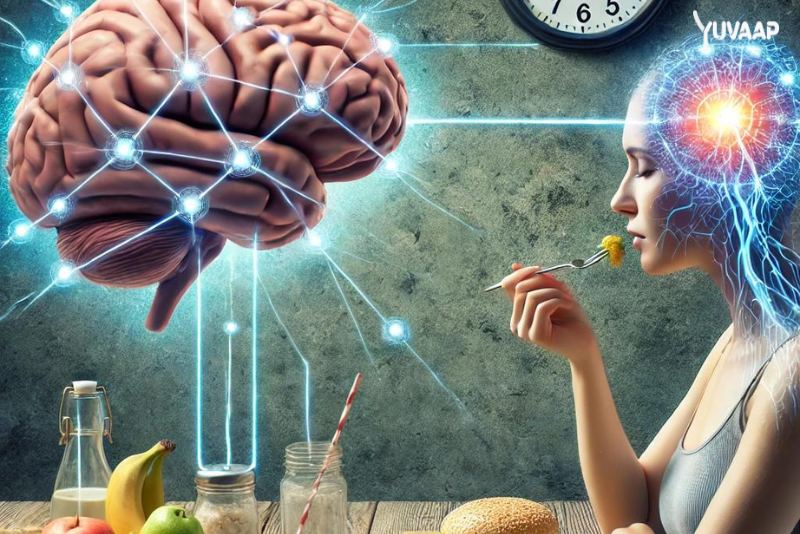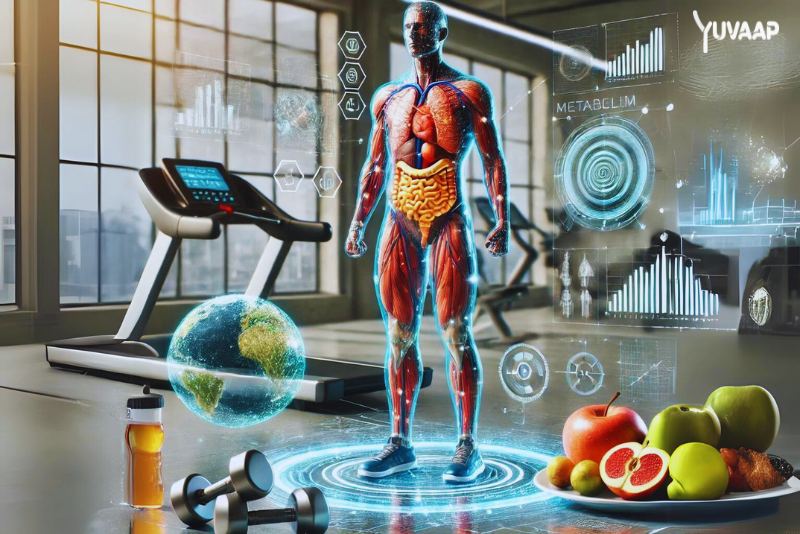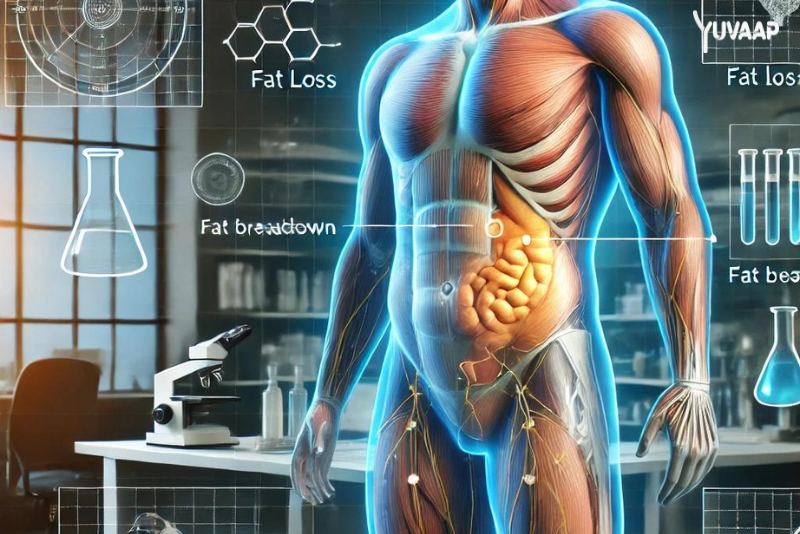Are you tired of trying diets and exercises that just don’t seem to work? Do you feel overwhelmed by all the conflicting advice out there about weight loss? You’re not alone. Understanding the science of weight loss can make the process clearer and more effective. It’s not just about cutting calories and exercising; it’s about knowing how your body burns fat, the role of metabolism, and how different foods and activities affect you.
In this blog, we’ll dive into the real science behind weight loss, with easy-to-understand explanations backed by reliable research. We’ll show you how to make small, practical changes that fit into your busy life, without breaking the bank. You’ll also learn about the benefits of holistic practices like yoga and meditation, supported by scientific evidence, that can help you manage stress and support your weight loss journey.
Whether you’ve tried and failed before or are just starting out, this blog will give you the tools and knowledge you need to succeed. Let’s take the guesswork out of weight loss and start a journey towards a healthier, happier you.
Science Behind Weight Loss

The science behind weight loss starts with understanding energy balance. At its core, weight loss occurs when the energy we expend exceeds the energy we consume. This concept is known as creating a caloric deficit.
- Energy Balance: This is the relationship between the calories we consume through food and the calories we burn through physical activities and bodily functions.
- Caloric Deficit: When we consume fewer calories than our body needs for maintenance, it starts using stored fat for energy, leading to weight loss. For a healthy approach to weight loss, watch our YouTube video.
Key Factors Influencing Weight Loss:
- Basal Metabolic Rate (BMR): This is the number of calories your body needs to maintain basic physiological functions like breathing and digestion while at rest. BMR varies from person to person based on factors such as age, gender, and muscle mass.
- Thermic Effect of Food (TEF): The energy required to digest, absorb, and process the nutrients from food. Certain foods, especially proteins, require more energy to process, thus increasing TEF. For more information on foods that boost metabolism, read our blog on foods that boost metabolism.
- Physical Activity: Exercise and daily activities contribute to overall calorie expenditure. Different types of physical activity, like aerobic exercise and strength training, have varying impacts on how the body burns calories.
Understanding these factors helps in making informed decisions about diet and exercise, aiding in effective and sustainable weight loss.
Do You Know the Brain is Responsible for Why and When We Eat?

Our brain plays a crucial role in regulating hunger and eating habits, significantly impacting our weight loss efforts. The hypothalamus, a small region at the base of the brain, is central to controlling hunger and satiety signals.
- Hunger Hormones: Hormones like ghrelin and leptin are essential in managing hunger and fullness. Ghrelin, produced in the stomach, signals hunger to the brain. In contrast, leptin, produced by fat cells, signals satiety or fullness.
- Psychological Factors: Stress, emotions, and psychological well-being can influence eating habits. For example, stress can trigger the release of cortisol, a hormone that can increase appetite and cravings for high-calorie foods. Mindfulness can help manage stress and control eating habits, as discussed in our blog on mindfulness meditation for weight loss.
How the Brain Influences Eating Behavior:
- Ghrelin: Often called the “hunger hormone,” ghrelin levels rise before meals and decrease after eating, signaling the brain to feel hungry or full.
- Leptin: Known as the “satiety hormone,” leptin helps regulate energy balance by inhibiting hunger. When body fat decreases, leptin levels drop, which can increase appetite.
- Cortisol: Chronic stress can lead to elevated cortisol levels, which may increase appetite and cravings for comfort foods, often rich in fat and sugar.
Holistic Practices for Better Regulation:
- Yoga and Meditation: These practices can help reduce stress and improve mental clarity, making it easier to manage emotional eating and cravings.
- Balanced Diet: Consuming a diet rich in whole foods, proteins, and healthy fats can help maintain stable ghrelin and leptin levels, supporting better appetite control.
By understanding the brain’s role in hunger and eating behaviors, we can adopt strategies to manage cravings and make healthier food choices, contributing to more effective weight loss.
The Role of Metabolism in Weight Loss

Metabolism plays a crucial role in the science of weight loss. It encompasses all the chemical reactions in your body that keep you alive and functioning. Understanding metabolism helps us grasp why some people lose weight more easily than others.
- Basal Metabolic Rate (BMR): Your BMR is the number of calories your body needs to perform basic functions like breathing, circulating blood, and cell production. It accounts for about 60-75% of the total calories you burn each day.
- Factors Influencing BMR:
- Age: Metabolism tends to slow down with age, making it easier to gain weight.
- Muscle Mass: More muscle means a higher BMR since muscle tissue burns more calories than fat tissue.
- Genetics: Your genetic makeup can influence your metabolism and how efficiently your body uses energy.
Metabolic Processes During Weight Loss:
- Thermogenesis: This is the process of heat production in organisms. When you eat, your body burns calories to digest, absorb, and process nutrients from food. This is known as the thermic effect of food (TEF).
- Physical Activity: As per research, Exercise increases your total daily calorie expenditure. Aerobic exercises like running and cycling, as well as anaerobic exercises like weightlifting, boost your metabolism.
- Non-Exercise Activity Thermogenesis (NEAT): These are the calories burned from non-exercise activities like walking, fidgeting, and even standing.
Boosting Your Metabolism:
- Exercise Regularly: Incorporate both aerobic and strength training exercises.
- Eat Protein-Rich Foods: Protein has a higher TEF compared to fats and carbohydrates, meaning your body burns more calories processing proteins.
- Stay Hydrated: Water is essential for the metabolic processes that burn calories.
By understanding and optimizing these factors, you can enhance your metabolism and improve your weight loss efforts.
Physiological Mechanisms of Fat Loss

The physiology of fat loss involves a complex interaction of hormones and enzymes that help mobilize and burn fat stored in the body.
- Lipolysis: Research says that This is the process where fat cells release stored triglycerides, which are broken down into free fatty acids and glycerol. These byproducts enter the bloodstream and are transported to the muscles and other tissues to be used as energy.
- Fat Oxidation: Once fatty acids reach the mitochondria in muscle cells, they undergo oxidation to produce energy. This process is essential for sustained weight loss.
Key Hormones Involved in Fat Loss:
- Insulin: Insulin helps regulate blood sugar levels. High insulin levels can prevent fat loss by promoting fat storage. Managing insulin through diet is crucial for effective weight loss.
- Glucagon: This hormone works in opposition to insulin, helping to mobilize stored fat for energy.
- Adrenaline and Noradrenaline: These hormones increase during exercise and stress, stimulating fat breakdown and increasing energy expenditure.
Factors Enhancing Fat Loss:
- Exercise: Physical activity, especially high-intensity interval training (HIIT), significantly boosts fat oxidation.
- Diet: As per research, Consuming a balanced diet with a focus on reducing refined carbohydrates and sugars helps maintain lower insulin levels, promoting fat loss.
- Rest and Recovery: Adequate sleep and stress management are essential. Lack of sleep and chronic stress can disrupt hormonal balance, hindering fat loss.
Understanding these physiological mechanisms allows for more targeted and effective strategies for achieving weight loss, contributing to better health and well-being.
Impact of Diet on Weight Loss

Diet is a fundamental component in the science of weight loss. The foods you choose to eat can significantly affect your ability to lose weight and maintain a healthy lifestyle.
- Macronutrients: These are the primary nutrients required in large amounts: carbohydrates, proteins, and fats. Each plays a unique role in weight management.
- Carbohydrates: Provide energy but can lead to weight gain if consumed in excess. Focus on complex carbs like whole grains and vegetables.
- Proteins: Essential for building and repairing tissues. They have a high thermic effect, meaning your body burns more calories digesting them.
- Fats: Necessary for hormone production and cell function. Choose healthy fats from sources like avocados, nuts, and olive oil.
Caloric Intake and Quality:
- Caloric Deficit: To lose weight, you need to consume fewer calories than your body expends. However, it’s essential to focus on the quality of calories, not just the quantity.
- Whole Foods: Opt for whole, unprocessed foods that are nutrient-dense and support overall health. These include fruits, vegetables, lean proteins, and whole grains.
- Avoid Empty Calories: Minimize consumption of foods high in sugar and refined carbs, such as sugary drinks and snacks. These provide little nutritional value and can contribute to weight gain.
Specific Dietary Strategies:
- Intermittent Fasting: This involves cycling between periods of eating and fasting. It can help reduce overall calorie intake and improve metabolism.
- Low-Carb Diets: Reducing carb intake can help lower insulin levels and increase fat burning.
- Balanced Diet: Ensure a balanced intake of all macronutrients to support metabolic health and energy levels.
Hydration:
- Water: Essential for all metabolic processes. Drinking adequate water helps in weight loss by promoting satiety and aiding digestion. For more information on foods that can help boost your metabolism, check out our blog on foods that boost metabolism.
By focusing on a balanced, nutrient-rich diet, you can support your body’s weight loss efforts and improve your overall health.
Exercise and Weight Loss

Exercise is a critical element in the science behind weight loss. It not only helps burn calories but also boosts your metabolism and improves overall health.
Types of Exercise:
- Aerobic Exercise: Activities like running, swimming, and cycling increase your heart rate and help burn calories. They are effective for overall weight loss.
- Strength Training: Lifting weights or using resistance bands builds muscle mass. Muscle tissue burns more calories than fat tissue, even at rest, enhancing your metabolism.
- High-Intensity Interval Training (HIIT): Research says that Short bursts of intense exercise followed by rest periods. HIIT is highly effective for burning fat and improving cardiovascular health. For a practical guide, watch our YouTube video on HIIT.
Benefits of Exercise:
- Increases Calorie Burn: Physical activity increases the number of calories your body burns, contributing to a caloric deficit.
- Enhances Metabolic Rate: Regular exercise boosts your resting metabolic rate, meaning you burn more calories even when not active.
- Improves Insulin Sensitivity: Exercise helps regulate blood sugar levels, reducing the risk of type 2 diabetes.
- Boosts Mental Health: Physical activity releases endorphins, which can reduce stress and improve mood, supporting emotional well-being.
Creating an Exercise Routine:
- Consistency: Regular exercise is key. Aim for at least 150 minutes of moderate aerobic activity or 75 minutes of vigorous activity each week, along with strength training exercises twice a week.
- Variety: Incorporate different types of exercise to keep your routine interesting and to work different muscle groups.
- Listen to Your Body: Ensure you are not over-exerting yourself. Rest and recovery are just as important as exercise.
For those interested in integrating yoga into their routine, our blog on yoga poses for weight loss provides excellent guidance.
Conclusion
Understanding the science of weight loss involves comprehending how the body burns fat, the role of metabolism, and the impact of diet and exercise. By focusing on boosting metabolism through regular exercise, prioritizing nutrient-dense foods, maintaining a caloric deficit, and combining different types of physical activities, you can achieve sustainable weight loss. Additionally, incorporating holistic practices like yoga and meditation supports mental and emotional well-being, making your weight loss journey both effective and balanced.
FAQs
References
https://www.ncbi.nlm.nih.gov/pmc/articles/PMC8290478
https://www.ncbi.nlm.nih.gov/pmc/articles/PMC4061651
https://www.ncbi.nlm.nih.gov/pmc/articles/PMC5556592

Priyanka Khurana Goyal is a prominent Indian figure renowned for her diverse accomplishments and contributions across various fields.. Read more


